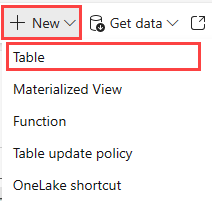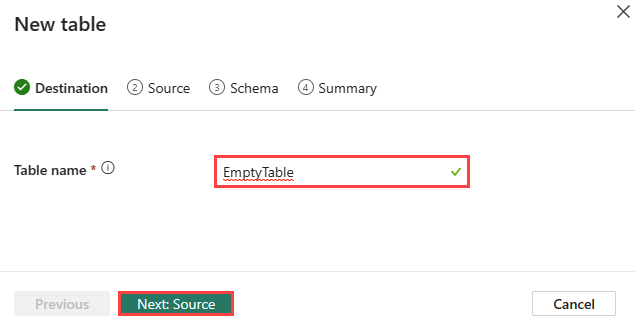Note
Access to this page requires authorization. You can try signing in or changing directories.
Access to this page requires authorization. You can try changing directories.
Tables are named entities that hold data. A table has an ordered set of columns, and zero or more rows of data. Each row holds one data value for each column of the table.
In this article, you learn how to create an empty table within the context of a KQL database.
Prerequisites
- A workspace with a Microsoft Fabric-enabled capacity
- A KQL database with editing permissions
Create an empty table in your KQL database
You can create an empty table without a data source to use as a testing environment, or for ingesting data in a later stage.
If you have a data source or a sample file prepared, you can use Get data to ingest data directly into a new table. For more information, see Get data overview.
Browse to your desired KQL database.
Select +New > Table.

Enter a Table name and Add a table description (optional).
Note
Table names can be up to 1,024 characters including alphanumeric, hyphens, and underscores. Special characters aren't supported.

Start the table schema by entering a Column name, and a description (optional).
Note
- The column name must start with a letter, and can contain numbers, periods, hyphens, or underscores.
- You need to create at least one column.
Select a data Type for your column. The default column type is
stringbut can be altered in the dropdown menu of the type field.You can continue to build the new table's schema. The options are:
- Select + Add column to add more columns.
- Select the delete icon to remove a column you just added.
- To see a read-only view of the commands that will run to create the table, you can open the Command viewer.

Select Create.
In the success message you can select to add data now or later:
- Select Close to return to the Eventhouse and Edit a table schema later.
- Select Get Data to start the ingestion process. For more information, see Get data overview.

Command viewer
The command viewer shows the commands for creating tables, mapping, and ingesting data in tables.
To open the command viewer, select the </> button on the right side of the command viewer. In the command viewer, you can view and copy the automatic commands generated from your inputs.
